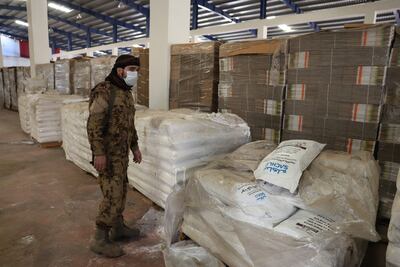Live updates: Follow the latest on Syria
The Assad regime long denied involvement in the Captagon trade, but hundreds of thousands of pills discovered by Syrian rebels in a warehouse on a hill in Douma, near Damascus, tell another story.
Hidden inside fake fruits, electrical devices and copper coils, these highly addictive pills have been smuggled out of Syria and exported across the Middle East, notably to Gulf countries, where their use is widespread.
The Douma warehouse was seized by Hayat Tahrir Al Sham (HTS) after president Bashar Al Assad’s forces were ousted from the area, offering journalists access for the first time to a Captagon production site. HTS fighters placed a picture of Mr Al Assad at the building’s entrance during a tour of the facility, resulting in people stepping on his face as they entered.
From the outside, the factory looks like any other, with neatly stacked cartons and mundane administrative documents stored haphazardly in boxes.
But a quick search revealed unprecedented evidence of the massive illicit trade, which Washington has accused Mr Al Assad and his close circle of profiting hugely from. Captagon is said to have been Syria's main export during the country's 13-year civil war.
According to the New Lines Institute, a Washington-based think tank, the global Captagon market was worth about $10 billion a year, with 80 per cent produced in Syria.
Ian Larson, a Syria analyst at the Centre for Operational Analysis and Research, said the country's Captagon factories were an "open secret".
“The images emerging now confirm the conclusions of many analysts and investigators: Captagon production in Syria is an industrial enterprise. This evidence leaves us no doubt of that,” he told The National.
In another section of the warehouse, several large barrels were stacked together, labelled with chemical names including hydrochloric acid and sodium hydroxide. Some were numbered to indicate production stages.
Inside a dark garage beneath the warehouse, a rebel shook a plastic apple, revealing white pills stamped with two intertwined half moons, typical of Captagon pills. “That’s how they were hiding them,” he said as they spilt out.

Small pieces of metal were placed inside the fake fruits so the weight would match that of real fruit. A pill presser was also found.
Mr Larson said the Douma warehouse was most likely "used for receiving and storing chemical inputs and also for packaging and concealing the manufactured pills".
“For years, there has been debate over the scale and systems involved in drug production in Syria. Now, we’re finally beginning to see behind closed doors," he said.
An owner under sanctions
According to locals and rebels interviewed by The National, the warehouse's owner is Amer Al Khiti, a former MP sanctioned in 2023 by the British government for controlling “multiple businesses in Syria that facilitate the production and smuggling of drugs”.
The garage was filled with campaign materials for his election run, including electoral cards and ballot papers. He was not available for comment.
Rebel fighters say the site is one of many warehouses they have discovered across the country and pledged to destroy. Videos posted online show them burning the pills.
Locals said they would never have thought Captagon was produced there. “They said it was a soap factory,” one neighbour said, pointing at the building from afar.
But analysts are not surprised. Caroline Rose, who studies the Captagon trade for the New Lines Institute, told The National on Sunday that the evidence uncovered at the Douma site was expected.
“We already had evidence of regime-operated industrial-scale production of Captagon, particularly in Douma, Latakia and Damascus,” she told The National. “I expect that residents and this new transitional government will uncover more sites.”
Enormous regional market
The cross-border flow of the drug has long been viewed as a major national security threat in the Middle East. Billions of dollars a year in Captagon have crossed from Syria into other Arab countries since 2018. In 2021, the Syrian government is estimated to have made more than $5 billion from the sale of the drug. Dealers often targeted the wealthy cities of the Gulf states, leading to drug busts in Saudi Arabia, the UAE and elsewhere.
The flow of the drug was one of the main reasons that Arab countries ended hostilities with Mr Al Assad three years ago and normalised ties with his government, as they were seeking co-operation in combating the smuggling operations.
One pill costs as little as a few US cents to produce, but high-quality pills have sold for as much as $20 each in Arab countries.
This week a European official told The National that Syria's production of the drug had come to a near halt since the ousting of Mr Al Assad.

“It is at least 90 per cent down,” said the official, who toured the border area between Jordan and Syria.
Over the past two weeks, Syrian militants have overrun the main Captagon factories in Syria's coastal areas. Members of cartels linked to the former regime and the Lebanese militant group Hezbollah have abandoned the production compounds, the official said.
“What is left are small, scattered workshops, and small players on the border,” he added.
However, Ms Rose said that the halt may be short lived.
“While Captagon supply will contract, at least in the short term, we should not expect the trade to disappear,” she said. “Rather, we’ll see a balloon effect into other transit sites like Iraq, Lebanon, and potentially Turkey.”
Mr Larson added that as long as demand for the drug persists, production will simply move abroad.
“There is an enormous regional market. If anything, the elimination of production in Syria will increase the relative value of production elsewhere," he said. "Demand still exists, and years of co-ordinated anti-narcotics campaigns in the region have not crushed it.
"The pressure for production to move to other countries is now far, far greater.”

